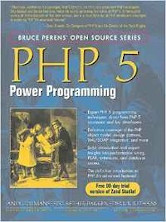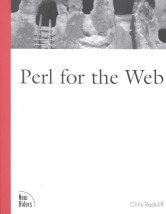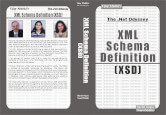Last Updated on December 25, 2024
4. PHP 5 Power Programming by Andi Gutmans, Stig Bakken, Derick Rethans
 In PHP 5 Power Programming, PHP 5’s co-creator and two leading developers show you how to make the most of PHP 5’s industrial-strength enhancements in any project, no matter how large or complex.
In PHP 5 Power Programming, PHP 5’s co-creator and two leading developers show you how to make the most of PHP 5’s industrial-strength enhancements in any project, no matter how large or complex.
Their unique insights and realistic examples illuminate the language’s new object model, powerful design patterns, improved XML Web services support, and much more. Whether you are creating web applications, extensions, packages, or shell scripts, or migrating PHP 4 code, here are high-powered solutions you will not find anywhere else.
Review syntax and master its object-oriented capabilities, from properties and methods to polymorphism, interfaces, and reflection.
The book enables users to:
- Master the four most important design patterns for development
- Write powerful web applications: handle input, cookies, session extension, and more
- Integrate with MySQL, SQLite, and other database engines
- Provide efficient error handling that is transparent to your users
- Leverage PHP 5’s improved XML support including parsing, XSLT conversions, and more
- Build XML-based web services with XML-RPC and SOAP
- Make the most of PEAR: work with the repository, use key packages, and create your own
- Upgrade PHP 4 code to PHP 5, compatibility issues, techniques, and practical workarounds
- Improve script performance: tips and tools for PHP optimization
- Use PHP extensions to handle files/streams, regular expressions, dates/times, and graphics
- Create original extensions and shell scripts
This book is part of Bruce Perens’ Open Source Series. All books in this series are released under the Open Publication License, v1.0 or later.
5. Perl for the Web by Chris Radcliff
 Perl for the Web provides the tools and principles needed to design a high-performance, dynamic Web site using Perl. Special attention is given to templates, integration, and load testing.
Perl for the Web provides the tools and principles needed to design a high-performance, dynamic Web site using Perl. Special attention is given to templates, integration, and load testing.
Topics covered include the need for speed, document management with templates and embedded Perl, faster performance using persistent Perl, good Web coding style, faster database access from Perl, and pairing XML with Perl for content management and B2B communication.
Emphasis is placed on robust, scalable solutions for dynamic database-backed, template-based or XML-based Web sites. The book’s focus on optimization is a unique approach. Readers of this book should be able to build a high-performance Perl-based Web solution as well as recommend one with confidence.
6. XML Schema Definition (XSD) by Vijay Mukhi, Shruti Gupta, Sonal Mukhi
 The XML Schema specifies the properties of a resource, while the XML file stipulates a set of values for these properties. The primary utility of the XML Schema lies in its ability to concede generous amount of autonomy to the programmer to define the rules of data validity; and thereafter, to hand over the responsibility of data validation to the XML validator. This liberates the programmer from the mundane drudgery of the task of data validation.
The XML Schema specifies the properties of a resource, while the XML file stipulates a set of values for these properties. The primary utility of the XML Schema lies in its ability to concede generous amount of autonomy to the programmer to define the rules of data validity; and thereafter, to hand over the responsibility of data validation to the XML validator. This liberates the programmer from the mundane drudgery of the task of data validation.
The book gets underway with the chapter on Dataset, which delves upon the concepts that relate to a database. It acquaints you with the nuances of the xsd file and its importance in the scheme of things.
The next chapter handles the concept of validating an XML file using the XML Schema, which is a surrogate for the Document Type Description or DTD. It encompasses all the rules that the XML file must conform to.
Then, in the next few chapters, the focus is veered towards the assimilation of the basic elements of the Schema file, such as attributes, inheritance, namespaces and restrictions. An entire chapter is dedicated to each one of them, wherein they are explored in considerable detail. Then, the intricacies of creating the XML Schema files using a program, are revealed. Finally, the last chapter in the book inquires into the mechanism of how the XML Schema Definition tool can be used to generate the XML Schema and the C# classes.
Next page: Page 3 – Rapid Application Development with Mozilla and more books
Pages in this article:
Page 1 – Processing XML with Java and more books
Page 2 – PHP 5 Power Programming and more books
Page 3 – Rapid Application Development with Mozilla and more books
All books in this series:
| Free Programming Books | |
|---|---|
| Ada | ALGOL-like programming language, extended from Pascal and other languages |
| Agda | Dependently typed functional language based on intuitionistic Type Theory |
| Arduino | Inexpensive, flexible, open source microcontroller platform |
| Assembly | As close to writing machine code without writing in pure hexadecimal |
| Awk | Versatile language designed for pattern scanning and processing language |
| Bash | Shell and command language; popular both as a shell and a scripting language |
| BASIC | Beginner’s All-purpose Symbolic Instruction Code |
| C | General-purpose, procedural, portable, high-level language |
| C++ | General-purpose, portable, free-form, multi-paradigm language |
| C# | Combines the power and flexibility of C++ with the simplicity of Visual Basic |
| Clojure | Dialect of the Lisp programming language |
| ClojureScript | Compiler for Clojure that targets JavaScript |
| COBOL | Common Business-Oriented Language |
| CoffeeScript | Transcompiles into JavaScript inspired by Ruby, Python and Haskell |
| Coq | Dependently typed language similar to Agda, Idris, F* and others |
| Crystal | General-purpose, concurrent, multi-paradigm, object-oriented language |
| CSS | CSS (Cascading Style Sheets) specifies a web page’s appearance |
| D | General-purpose systems programming language with a C-like syntax |
| Dart | Client-optimized language for fast apps on multiple platforms |
| Dylan | Multi-paradigm language supporting functional and object-oriented coding |
| ECMAScript | Best known as the language embedded in web browsers |
| Eiffel | Object-oriented language designed by Bertrand Meyer |
| Elixir | Relatively new functional language running on the Erlang virtual machine |
| Erlang | General-purpose, concurrent, declarative, functional language |
| F# | Uses functional, imperative, and object-oriented programming methods |
| Factor | Dynamic stack-based programming language |
| Forth | Imperative stack-based programming language |
| Fortran | The first high-level language, using the first compiler |
| Go | Compiled, statically typed programming language |
| Groovy | Powerful, optionally typed and dynamic language |
| Haskell | Standardized, general-purpose, polymorphically, statically typed language |
| HTML | HyperText Markup Language |
| Icon | Wide variety of features for processing and presenting symbolic data |
| J | Array programming language based primarily on APL |
| Java | General-purpose, concurrent, class-based, object-oriented, high-level language |
| JavaScript | Interpreted, prototype-based, scripting language |
| Julia | High-level, high-performance language for technical computing |
| Kotlin | More modern version of Java |
| LabVIEW | Designed to enable domain experts to build power systems quickly |
| LaTeX | Professional document preparation system and document markup language |
| Lisp | Unique features - excellent to study programming constructs |
| Logo | Dialect of Lisp that features interactivity, modularity, extensibility |
| Lua | Designed as an embeddable scripting language |
| Markdown | Plain text formatting syntax designed to be easy-to-read and easy-to-write |
| Objective-C | Object-oriented language that adds Smalltalk-style messaging to C |
| OCaml | The main implementation of the Caml language |
| Pascal | Imperative and procedural language designed in the late 1960s |
| Perl | High-level, general-purpose, interpreted, scripting, dynamic language |
| PHP | PHP has been at the helm of the web for many years |
| PostScript | Interpreted, stack-based and Turing complete language |
| Prolog | A general purpose, declarative, logic programming language |
| PureScript | Small strongly, statically typed language compiling to JavaScript |
| Python | General-purpose, structured, powerful language |
| QML | Hierarchical declarative language for user interface layout - JSON-like syntax |
| R | De facto standard among statisticians and data analysts |
| Racket | General-purpose, object-oriented, multi-paradigm, functional language |
| Raku | Member of the Perl family of programming languages |
| Ruby | General purpose, scripting, structured, flexible, fully object-oriented language |
| Rust | Ideal for systems, embedded, and other performance critical code |
| Scala | Modern, object-functional, multi-paradigm, Java-based language |
| Scheme | A general-purpose, functional language descended from Lisp and Algol |
| Scratch | Visual programming language designed for 8-16 year-old children |
| SQL | Access and manipulate data held in a relational database management system |
| Standard ML | General-purpose functional language characterized as "Lisp with types" |
| Swift | Powerful and intuitive general-purpose programming language |
| Tcl | Dynamic language based on concepts of Lisp, C, and Unix shells |
| TeX | Markup and programming language - create professional quality typeset text |
| TypeScript | Strict syntactical superset of JavaScript adding optional static typing |
| Vala | Object-oriented language, syntactically similar to C# |
| VHDL | Hardware description language used in electronic design automation |
| VimL | Powerful scripting language of the Vim editor |
| XML | Rules for defining semantic tags describing structure ad meaning |
